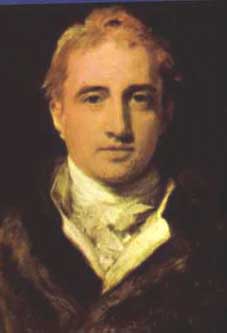Viscount Castlereagh (1769-1822)
Robert Stewart, 2nd Marquess of Londonderry, known widely by his courtesy title Viscount Castlereagh, was a significant figure in British and European history during the late 18th and early 19th centuries. His political career, marked by both acclaim and controversy, played a pivotal role in shaping the post-Napoleonic era. Despite his influence, Castlereagh's life was shadowed by personal struggles, culminating in a tragic end.

Early Life and Education
Robert Stewart was born on June 18, 1769, in Dublin, Ireland, to Robert Stewart, 1st Marquess of Londonderry, and his first wife, Sarah Frances Seymour. As the eldest son of an Anglo-Irish aristocrat, young Robert was destined for a life in public service. He received an excellent education, first at Armagh and later at the University of Cambridge, although he left Cambridge without taking a degree. His upbringing and education ingrained in him a deep sense of duty to both his family and his country.
Early Political Career
Stewart's political career began at the age of 21 when he entered the Irish Parliament as the Member for Down in 1790. His early years in politics were marked by his support for reform and his advocacy for Catholic emancipation, a stance that aligned him with more liberal elements within Irish politics at the time. However, as the French Revolution took a more radical turn, Stewart's views began to shift towards conservatism.
In 1798, during the Irish Rebellion, Stewart's loyalty to the British Crown became evident. He served as Chief Secretary for Ireland, playing a crucial role in suppressing the uprising. His handling of the rebellion earned him the trust of the British government, but also sowed the seeds of resentment among Irish nationalists.
The Act of Union and British Parliament
One of Stewart's most significant early achievements was his involvement in the passage of the Act of Union in 1800, which merged the Kingdom of Ireland with the Kingdom of Great Britain to create the United Kingdom of Great Britain and Ireland. He worked tirelessly to secure the necessary support for the Union, which was passed in part through a combination of political maneuvering and the promise of Catholic emancipation—a promise that was not immediately fulfilled, leading to further controversy.
Following the Act of Union, Stewart entered the British Parliament as a representative for the newly created United Kingdom. He continued to rise through the political ranks, serving in various capacities including as President of the Board of Control and Secretary of State for War and the Colonies.
Castlereagh and the Napoleonic Wars
Stewart's most prominent role came during the Napoleonic Wars, where he served as Britain's Foreign Secretary from 1812 to 1822. This period was marked by his leadership in forging the alliances that eventually defeated Napoleon. Castlereagh's diplomatic skills were instrumental in the formation of the Sixth Coalition, and he played a key role in the Congress of Vienna (1814-1815), which reshaped Europe after Napoleon's defeat.
At the Congress of Vienna, Castlereagh advocated for a balance of power that would prevent any one nation from dominating Europe, a principle that became a cornerstone of British foreign policy for the next century. However, his efforts were not without criticism. Some contemporaries accused him of being too lenient on France, while others felt he was too willing to compromise with autocratic regimes to maintain stability.
Domestic Policies and Controversies
Domestically, Castlereagh's tenure was less successful. His conservative stance and support for repressive measures, such as the suspension of habeas corpus and the Peterloo Massacre in 1819, made him deeply unpopular among the British public. These actions were seen as attempts to stifle growing demands for political reform and greater civil liberties. As a result, Castlereagh became a target of public anger and criticism, with many viewing him as an opponent of progress.
Despite his unpopularity, Castlereagh remained a central figure in the British government, steadfastly advocating for the maintenance of order and stability, both at home and abroad.
Personal Struggles and Tragic End
Throughout his life, Robert Stewart struggled with bouts of depression and mental illness, which were exacerbated by the immense pressures of his political career. These personal demons ultimately led to his tragic death. On August 12, 1822, Castlereagh took his own life at his country estate, North Cray Place, in Kent. His death shocked the nation and led to a wave of both sympathy and reflection on the burdens of public service.
Legacy
Robert Stewart, 2nd Marquess of Londonderry, left a complex legacy. As Viscount Castlereagh, he was a diplomat of extraordinary skill, whose efforts helped to bring about a lasting peace in Europe after the Napoleonic Wars. His vision for a balance of power shaped European politics for decades. However, his domestic policies and the repression of civil liberties during his tenure as Foreign Secretary left a stain on his reputation.
In the years following his death, Castlereagh's contributions to British and European history have been re-evaluated. While his methods and decisions remain subjects of debate, his role as a statesman who navigated one of the most turbulent periods in European history cannot be denied.
External links
Wikipedia - Robert Stewart, Viscount Castlereagh
Royal Collection Trust - Robert Stewart (1769-1822), Viscount Castlereagh
